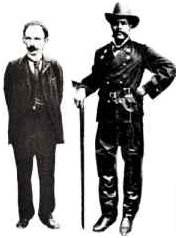
Martí's First Letter to Antonio Maceo
New York, July 20, 1882
General Antonio Maceo
Sir and friend:

The sudden departure of my friend Flor Crombet left me no time to
explain to you, with the clarity and thoroughness I desire, the importance and
present state of efforts recently undertaken to rebuild the revolutionary
forces, to move in Cuba in a unanimous and certain manner the people's spirits
into our ways of thinking, and to prepare abroad, with the affectionate unity
and judicious conduct of the brave and good in whom Cuba still has faith, a
swift and brilliant war which may ever be considered an honor and not a crime
by those taking part in it. I do not know, General Maceo, a braver soldier or a
more tenacious Cuban than yourself. Nor would I understand any attempt to make
a serious effort in Cuban affairs-as I and so many others are now attempting to
make-in which you did not figure in the special and prominent way to which your
abilities entitle you. For lack of time I cannot begin, however much it
displeases me, to explain to you how necessary it is, now that in spite of us
there have arisen in Cuba after the war elements which are not ours, to
skillfully win these elements to our side, since they are now showing a desire
to come. We must avail ourselves of them, now that doing without them would not
only be unjust, but impossible. I cannot begin to explain to you, since the
country is once again restless and turning its eyes to those who are to be its
saviors, how it is again seeking its constant defenders, who today go about
with their lips sealed, but as great as they are silent, separated, isolated,
and therefore impotent. As long as the country was not calling, it seemed to be
a senseless and violent act to force it to shed blood it refused to shed. But
now that the country is calling, it is necessary to respond to it on pain of
its justly forgetting those who fail to respond, and of its calling upon others
whom it considers better men. I do not have the time to explain to you how the
repentant revolutionaries, and the new men of Cuba who believed they could
dispense with the revolution, are now easily joining the active revolutionary
group. Nor do I have time to tell you, General, why in my view the solution to
the Cuban problem is not a political but a social one, and why this can be
accomplished only by that mutual love and forgiveness on the part of both
races, and by that ever worthy and ever generous wisdom with which I know your
proud and noble heart is animated. For me the man who inspires hatred in Cuba,
or avails himself of the hatred that already exists, is a criminal. And another
criminal is he who tries to stifle the legitimate aspirations of life in a wise
and good breed of men who have already been sufficiently unfortunate. You
cannot imagine how extremely tenderly I think about these wrongs, and about how
to eliminate them-not vociferously or professedly, but in a quiet, active,
loving, and evangelical manner. You would be most keenly pleased, General
Maceo, if instead of my writing you these cold facts we could talk about them.
I esteem your extraordinary qualities and divine in you a man capable of
achieving a truly durable, grandiose, and solid glory.
Cuba in a unanimous and certain manner the people's spirits
into our ways of thinking, and to prepare abroad, with the affectionate unity
and judicious conduct of the brave and good in whom Cuba still has faith, a
swift and brilliant war which may ever be considered an honor and not a crime
by those taking part in it. I do not know, General Maceo, a braver soldier or a
more tenacious Cuban than yourself. Nor would I understand any attempt to make
a serious effort in Cuban affairs-as I and so many others are now attempting to
make-in which you did not figure in the special and prominent way to which your
abilities entitle you. For lack of time I cannot begin, however much it
displeases me, to explain to you how necessary it is, now that in spite of us
there have arisen in Cuba after the war elements which are not ours, to
skillfully win these elements to our side, since they are now showing a desire
to come. We must avail ourselves of them, now that doing without them would not
only be unjust, but impossible. I cannot begin to explain to you, since the
country is once again restless and turning its eyes to those who are to be its
saviors, how it is again seeking its constant defenders, who today go about
with their lips sealed, but as great as they are silent, separated, isolated,
and therefore impotent. As long as the country was not calling, it seemed to be
a senseless and violent act to force it to shed blood it refused to shed. But
now that the country is calling, it is necessary to respond to it on pain of
its justly forgetting those who fail to respond, and of its calling upon others
whom it considers better men. I do not have the time to explain to you how the
repentant revolutionaries, and the new men of Cuba who believed they could
dispense with the revolution, are now easily joining the active revolutionary
group. Nor do I have time to tell you, General, why in my view the solution to
the Cuban problem is not a political but a social one, and why this can be
accomplished only by that mutual love and forgiveness on the part of both
races, and by that ever worthy and ever generous wisdom with which I know your
proud and noble heart is animated. For me the man who inspires hatred in Cuba,
or avails himself of the hatred that already exists, is a criminal. And another
criminal is he who tries to stifle the legitimate aspirations of life in a wise
and good breed of men who have already been sufficiently unfortunate. You
cannot imagine how extremely tenderly I think about these wrongs, and about how
to eliminate them-not vociferously or professedly, but in a quiet, active,
loving, and evangelical manner. You would be most keenly pleased, General
Maceo, if instead of my writing you these cold facts we could talk about them.
I esteem your extraordinary qualities and divine in you a man capable of
achieving a truly durable, grandiose, and solid glory.
In my next letter I shall explain all we have done and intend to do concerning all I have told you. To this and to what Flor Crombet has charge of explaining to you I hope you will respond that you applaud and share these ideas and this serious and ordered reappearance of all the important and truly faithful men involved in our cause-men who are sincerely and passionately united-without the need of swearing blind obedience to any isolated group or any one man, in order to wisely and promptly avail themselves of the new seething, and daily more imposing, elements of war in Cuba. Much is already being done. This formal and public reappearance is much desired. But on my part I have begun refraining from all isolated and insignificant work not responsive to the grandiose work they expect of us. We must appear heroic since they want us to be heroic. If they look upon us as of a lesser stature than their expectations, this will be like striking us dead. But no matter how much they solicit and support it, I do not consider any revolutionary manifestation either legal or powerful unless it is agreed to, and counseled and directed by, the courageous and good men who have acquired this special right through their merits. Having to restrain the impatient and those who believe that by keeping quiet they will lose precious time, imagine how impatiently I await your reply regarding these thoughts I am pointing out to you. You can guess how eager I am for your opinion about this new form of our work that is today directed toward preparing actively and rationally, with all the firmness and skill required by so grave and extraordinary a problem, the way to create, by means of a prompt and possibly successful war, a country into which, in spite of being extremely strained by hatred, all of its diverse elements have been entering since its beginnings in order to enjoy their true rights under conditions for a long and peaceful life. I know you never tire of doing difficult things. And your clear judgment is not clouded like that of the common people; it comprises the entire magnitude of our task and our responsibility.

Perhaps, because of my hatred for useless publicity, you are not aware of who is writing this letter. Flor Crombet will tell you. And I tell you that it is written by a man who knows how much you are worth and esteems you highly.
He awaits your reply impatiently, and remains affectionately at your service.
Your friend and servant,
José Martí
José Martí's Letters to Antonio Maceo:
July 20 1882 / June 18 1894 /
June 22 1894 /
January 19 1895
Martí on Maceo (from Patria) |
José Martí Portal | Martí/Apostle | Timeline | Books | Photos
Related:
Antonio Maceo | War for Independence